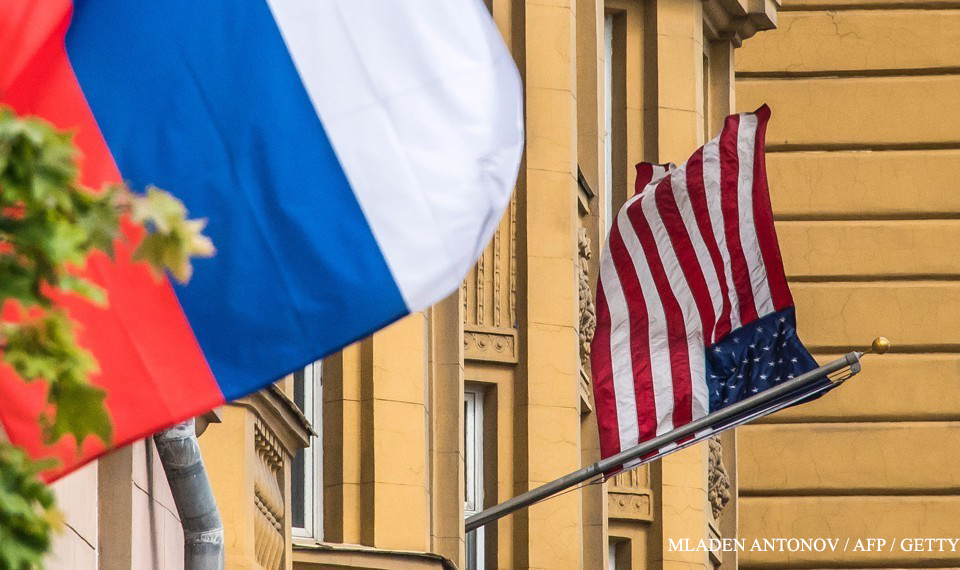Situation in the combat zone
Situation in the combat zone. Over the last week, combat actions in the war zone in eastern Ukraine proceeded with higher intensity than in the previous week.
OSCE. Last week the OSCE Special Monitoring Mission to Ukraine (OSCE SMM) recorded a 25-percent decrease in the number of the ceasefire violations compared with the previous week. The daily number of ceasefire violations varied between 200 and 1,000, reported Alexander Hug, Principal Deputy Chief Monitor of the OSCE Special Monitoring Mission to Ukraine, at a press-briefing at Ukraine Crisis Media Center. “In Dokuchaievsk, we confirmed that six civilians had sustained injuries as a result of the hostilities,” Alexander Hug said. Two civilians were wounded by unexploded ordnance – in the area of the uncontrolled Donetsk and in government-controlled Verkhniotoretske. OSCE SMM monitors also confirmed the death of a 57-year old man killed in Olenivka on January 21.
The “Normandy format” meeting. The meeting of the heads of foreign affairs ministries of the “Normandy format” member countries (Ukraine, Germany, France and the Russian Federation) may take place within the Munich Security Conference on February 16, said Pavlo Klimkin, Minister of Foreign Affairs of Ukraine at a joint press-conference with Angelino Alfano, Minister of Foreign Affairs and International Cooperation of Italy last week in Kyiv.
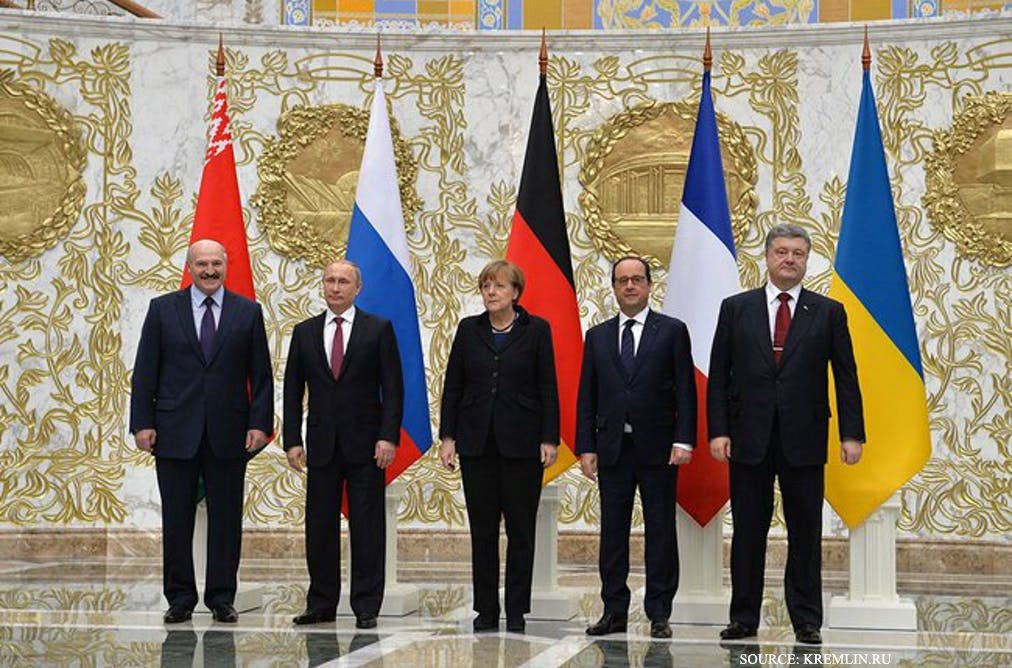
Rallies in Kyiv
On February 3-4, several rallies took place in Kyiv. Among them was the so-called “March for the Future” organized by the supporters of Mikheil Saakashvili and the “Movement of New Forces” chaired by the ex-president, and a rally against the setup of the “Natsionalni Druzhyny” (the National Militia Units) linked to the Azov movement.
“March for the future”. About a thousand Saakashvili’s supporters got together in Shevchenko Park in downtown Kyiv holding the placards saying: “Impeachment to the President Poroshenko”. After the column started, more people were joining it on its way. Police estimated the number of the rally participants equal to seven thousand. Media reported five to ten thousand people attending. “Our demands were very simple: to pass the law on impeachment, to set up the Anti-Corruption Court, to adopt a new election law and to strip the MPs of the immunity. What we got instead is political terror and repressions, arrests, persecution and fabricated criminal cases,” a news piece on Saakashvili’s Facebook page reads. The rally walked past the Maidan square up to the European square. The previous “march for impeachment” took place on December 17. Back then the rally participants clashed with the law enforcement outside the Palace of Arts and Culture (former Zhovtnevy Palace). The leader of the “Movement of New Forces” Mikheil Saakashvili promised to make public the list of candidates to the leading posts in the government at the next rally scheduled for February 18. The lawyers of the former Georgian President have appealed the court decision of the Tbilisi city court of January 5, reports the Georgian TV channel Rustavi-2. The court sentenced Saakashvili in absentia to 3 years in prison.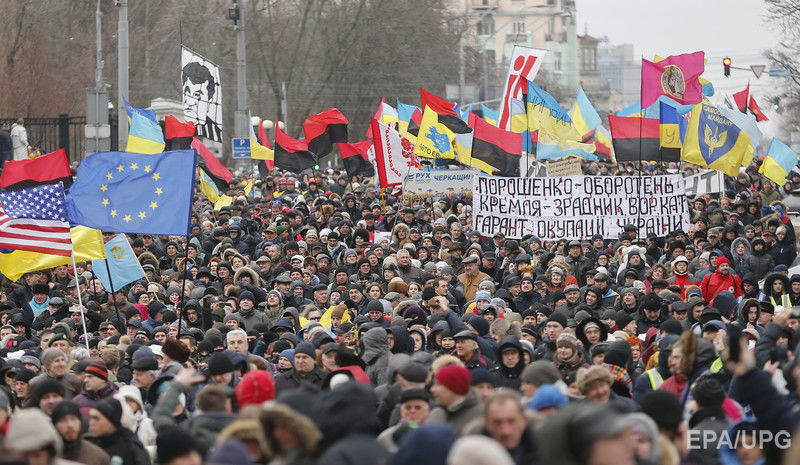
A mini-rally against the Natsionalni Druzhyny. People rallied in Kyiv against the Natsionalni Druzhyny – an NGO founded by the veterans of the Azov regiment. Several dozen people got together at Poshtova square to protest against what they see as the legitimization of paramilitary movements in Ukraine. People took to the streets holding the placards saying: “We want no Druzhyny”, “Wherever people walk in formations, there will be no freedom” and “For a society with no violence!”.
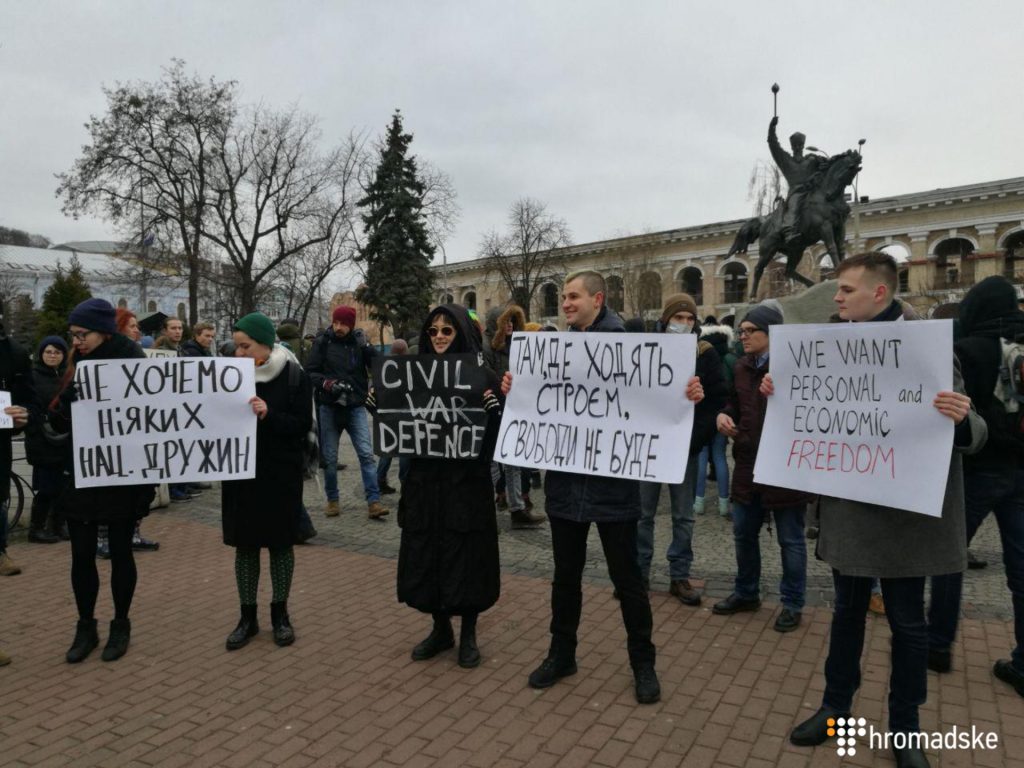 Read also: “Paramilitary units or a PR move: 10 facts about ‘The National Militia Units’”
Read also: “Paramilitary units or a PR move: 10 facts about ‘The National Militia Units’”
The “Kremlin Report”: will the further US pressure on Russia have its effect?
What is the “Kremlin Report”? Last week the US Treasury Department released the “Kremlin Report”. It is a list of 210 persons – 114 officials and parliamentarians, and 96 oligarchs close to the President of Russia Vladimir Putin. The list is split into four parts: presidential administration (all the leaders included, 8 members of the presidential administration are already sanctioned); the Cabinet of Ministers (government members headed by Dmitriy Medvedev); other high-ranking political leaders (leaders of the parliament, chiefs of law enforcement and of the federal agencies); oligarchs (businessmen whose assets are estimated worth of $1 billion or more). Vladimir Putin was not included in the “Kremlin Report”.
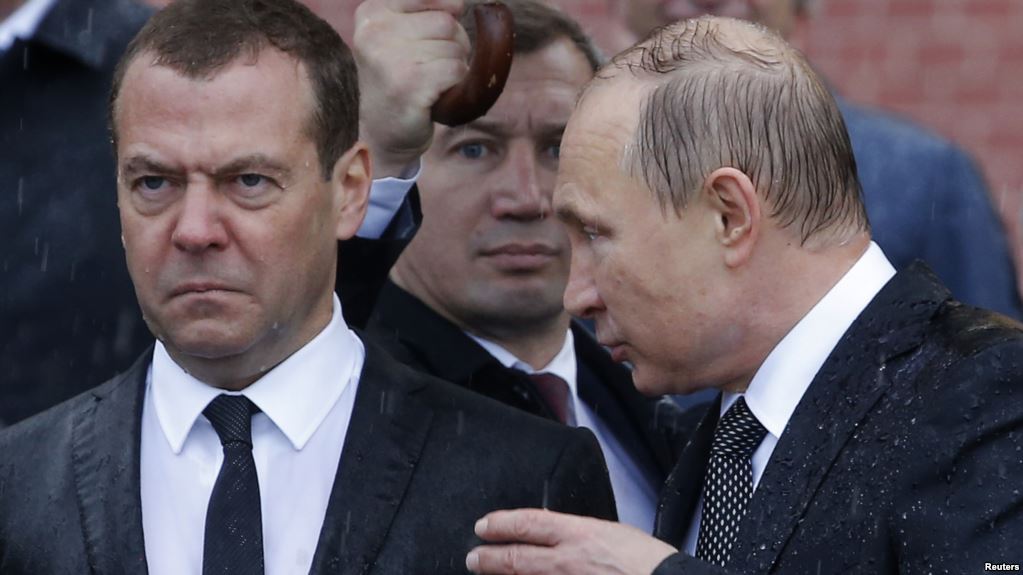
How the list was compiled and why it was changed. Anders Åslund, a senior fellow with the Atlantic Council, who was one of the expert advisers on compiling of the “Kremlin Report”, writes that there was an initial list compiled by a team of experts. However, all of a sudden it was substituted by a high-ranking official from the US presidential administration with the one compiled based on the Forbes ranking of the world’s richest persons as well as the officials of the Russian Presidential administration. Åslund is not aware of the fact who the high-ranking official in question was, but he claims that Steven Mnuchin, the US Secretary of the Treasury bears the responsibility for the changes as it was him who has approved the list.
What are the persons listed in the “Kremlin Report” facing? The “Kremlin Report” does not imply the automatic introduction of the sanctions against the persons listed in it, the experts say. For example, according to the Atlantic Council expert Daniel Fried, persons on the list will not immediately face the practical consequences – for example, financial ones. Nevertheless, the mere fact of becoming part of this list increases the risk of having the sanctions imposed on them in the future, the expert emphasized.
Why are experts and media disappointed? Brian Whitmore, an RFERL observer, writes that disappointment was his first reaction to the long-awaited list rolled out by the US Treasury and featuring the most influential officials and oligarchs of Russia. It turned out to be nothing more than “reference information” on who is who in the Russian politics. However, according to the author, the Kremlin Report still sends out important messages. It comes as a reminder that the Russian political and economic systems are based on corruption, kleptocracy, and cronyism, as well as is a “cold signal” to the Russian elites that may find themselves surprised all of a sudden at some point that they cannot get a visa or open a banking account in the West.
What the US Treasury says. Steven Mnuchin, the US Secretary of the Treasury, said that the Donald Trump administration would impose financial sanctions on dozens of wealthy Russians who are part of the “Kremlin Report”. He emphasized that the released “Kremlin Report” is not to become a substitute for the financial restrictions upon the Russians. “This should in no way be interpreted as we’re not putting sanctions on any of the people in that report,” Mnuchin said.
Is there a “classified part” of the report? According to the US Treasury Department, there is a classified part that speaks of the future economic sanctions against the persons listed in the report, Bloomberg quotes Steven Mnuchin, the US Treasury Secretary, and Tony Sayegh, the department’s assistant secretary for public affairs. Thus, Mnuchin stated that the “Kremlin Report” will result in imposing of the sanctions, Sayegh confirmed it. According to the latter, the report has a classified part. “Treasury included a classified annex in the report in order to avoid potential asset flight from the named individuals and entities, as well as to prevent disclosure of sensitive information,” Sayegh added.
Russia’s reaction. Responding to the “Kremlin Report” rolled out by the US, the Federal Council (Sovet Federatsii) of the Russian Federation started preparing the draft law that is to define the notion “interference into the sovereignty of the state”. Co-author of the document Lyudmila Bokova said that one of the actions within the “symmetrical response” is introducing into the law the notions of “sovereignty” and “interference into the sovereignty of the state”. RBC, quoting a source close to the commission, said the document is “a revenge for the report and the ban of the Russian national team from the Winter Olympics”.
A new standoff with Poland: the “anti-Bandera” law
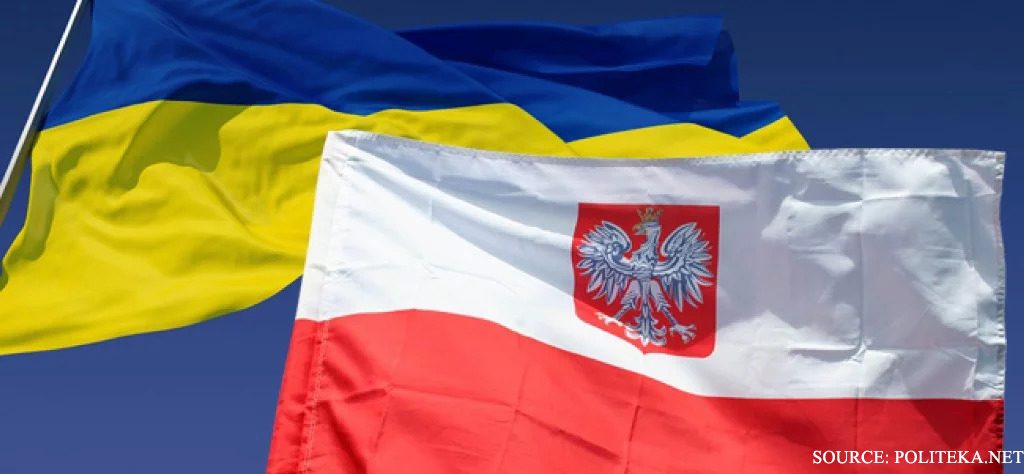
What the new law is about. At night on February 1, the Polish Senate adopted a new version of the Law “On the Institute of National Remembrance”. According to the Law, persons talking of the “Polish-organized concentration camps” or denying “the crimes of Ukrainian nationalists” may be held criminally liable. The law is yet to be signed by the President of Poland Andrzej Duda, he has 21 days to do so.
How it works. According to the law, it will be possible to hold criminally liable those who will be using term “Polish concentration camps” in public or will acknowledge the participation of Poland or Poles in the Holocaust. A fine can be imposed or a three-year sentence may follow. Perpetrators outside of Poland can be held liable as well.
International reaction: Israel. Due to the approval of the law, Israel has canceled the visit of the Polish Head of the National Security Bureau to Jerusalem. Media also reported the intention of the state to approve the decision to withdraw its ambassador from Poland.
President Poroshenko’s reaction: “biased”. The President Petro Poroshenko emphasized that the adopted law does not correspond with the earlier declared principles of strategic partnership between Ukraine and Poland as well as urged the Polish side “for objectivity and a dialogue”.
The reaction of the Foreign Affairs Minister Klimkin: “we are for an equal dialogue”. “We have always stood for an equal dialogue and strategic partnership with Poland, but we do not perceive the language of bans and limitations,” the Minister of Foreign Affairs of Ukraine Pavlo Klimkin said. He also noted that the idea of recognizing certain nations as criminal leads nowhere.
The reaction of the director of the Ukrainian Institute of National Remembrance: a threat to Ukrainians in Poland. Volodymyr Vyatrovych, director of the Ukrainian Institute of National Remembrance, noted that the Polish law in question is first of all directed against the Ukrainians living in Poland, and is supported by the pro-Russian forces.
OSCE is concerned. The OSCE is also concerned with the adoption of the Law on the setup of the Institute of National Remembrance. “History is a matter of independent academic research and of free discussion, not of judiciary decision. The law should be rejected as a disproportionate restriction of freedom of expression. Only when statements constitute incitement to violence or discrimination could they be criminalized,” said Harlem Désir, OSCE Representative on Freedom of the Media.
IMF’s new loans: what is the price?

The International Monetary Fund set a condition for Ukraine to have the Extended Fund Facility reconsidered and the next tranche disbursed: it is the adoption of the Law on the Anti-Corruption Court as well as bringing the gas prices to the market level, said Goesta Ljungman, IMF Resident Representative in Ukraine.
Anti-Corruption Court. The setup of the Anti-Corruption Court in line with all the recommendations by the Venice Commission is the main obstacle on the way to the IMF loans. No progress is currently observed in this area. On the contrary, last week fake information was spread that the IMF is ready to soften its conditions and that it approves of the draft law submitted by the President.
Read also: “Simulation or step forward: will there be the Anti-Corruption Court in Ukraine?”
What to do with the gas prices. According to IMF’s Ljungman, the introduction of the market prices for gas aims at avoiding the artificial segmentation of the market separately for households and for the industry. There are certain conditions and they need to be fulfilled. “These are the achievable figures and we hope for their quick implementation,” Ljungman said.
Refrain from the increasing salaries. The Ukrainian authorities are tempted to increase the salaries very quickly, however, it is going to have a negative impact on the growth of the economy, Goesta Ljungman is convinced. The International Monetary Fund supports the increase of salaries for Ukrainians only in accordance with the increase of the labor productivity, as the higher pace will have a negative impact on the growth of the economy.
Culture: A documentary about a Ukrainian boy in the near-front area wins an award at the biggest Scandinavian festival
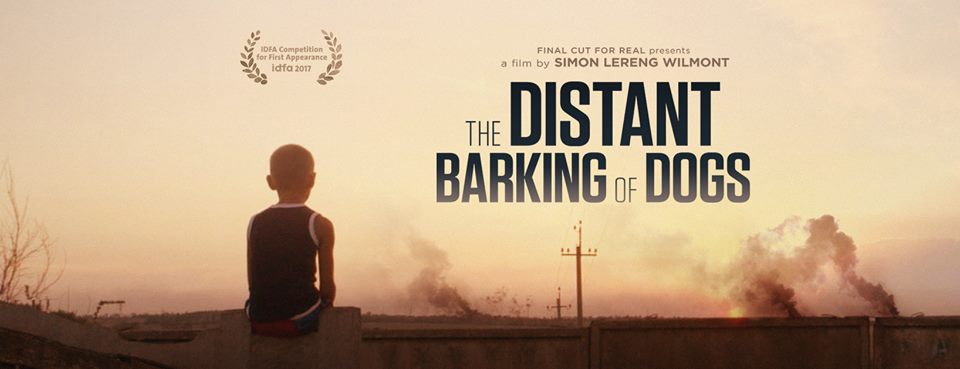
“The Distant Barking of Dogs”, the documentary telling about 10-year old Ukrainian boy living in the near-front town in eastern Ukraine won an award at the biggest Scandinavian film festival – Göteborg Film Festival in Sweden. The documentary received the Dragon Award for Best Nordic Dox and thus was acknowledged as the best Scandinavian documentary. It was co-produced by Denmark, Sweden, and Finland. The movie was directed by Simon Lereng Wilmont from Denmark. For a year the film crew followed the path of Oleh who lives in Hnutove, Donetsk region, together with his grandmother. Last year “The Distant Barking of Dogs” won the First Appearance Award as a debut feature at one of Europe’s key documentary film festivals IDFA in the Netherlands.


